Electric vehicles
Hyundai-LG battery JV in Indonesia to power IONIQ 5, other EVs: Chung
The Korean automaker also plans to bring the IONIQ 6 and other EVs to the ASEAN market
By Sep 08, 2023 (Gmt+09:00)
4
Min read
Most Read
Hankook Tire buys $1 bn Hanon Systems stake from Hahn & Co.


NPS to hike risky asset purchases under simplified allocation system


UAE to invest up to $1 bn in S.Korean ventures


Osstem to buy BrazilŌĆÖs No. 3 dental implant maker Implacil


US multifamily market challenges create investment opportunities


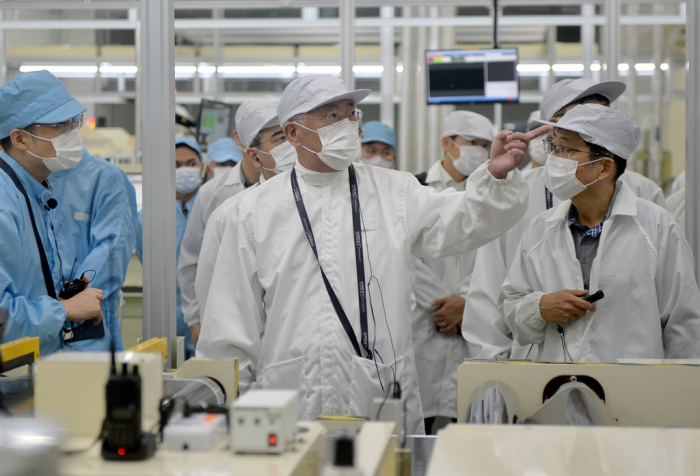
Hyundai Motor Co.'s┬Ābattery joint venture with LG Energy Solution Ltd. in Indonesia will become the South Korean carmakerŌĆÖs battery manufacturing hub for vehicles such as the IONIQ 5, IONIQ 6 and other EVs to be sold in the Southeast Asian market, Chairman Chung Euisun said.
During his first visit to the JV ŌĆō Hyundai LG Indonesia Green Power ŌĆō on Thursday, Chung said battery cells produced at the factory will be installed in the IONIQ 5 crossover, currently rolling out at its Indonesian car-making plant, and other EVs to be made by Hyundai and affiliate Kia Corp. in Indonesia.
ŌĆ£We want batteries from the factory to be perfect,ŌĆØ he said while looking around the plant with other Hyundai executives, including Chief Executive Chang Jae-hoon.
He is in Jakarta as part of an economic delegation to Korean President Yoon Suk YeolŌĆÖs visit to Indonesia for a summit meeting of the 10-member Association of Southeast Asian Nations (ASEAN) plus South Korea, Japan and China.
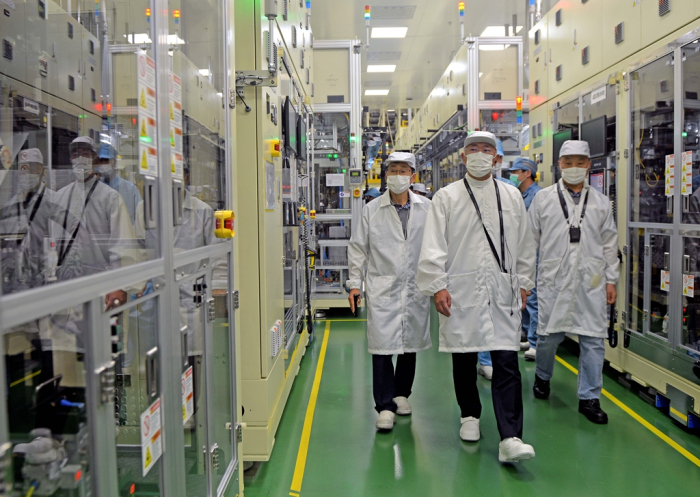
A number of Korean business leaders, including Chung, accompanied Yoon to Indonesia to seek business opportunities as this year marks the 50th anniversary of Korea-Indonesia diplomatic relations.
The $1.1 billion battery plant, located in Karawang New Industry City, near Jakarta, broke ground in September 2021 as Hyundai hoped to secure a stable supply of battery cells for its electric cars targeting the ASEAN market.
NCMA BATTERY CELLS
Construction of the factory was completed in June this year. After production tests, it is slated to begin commercial production in the first half of 2024 with an annual capacity of 10 GWh of battery cells, enough for over 150,000 EVs.
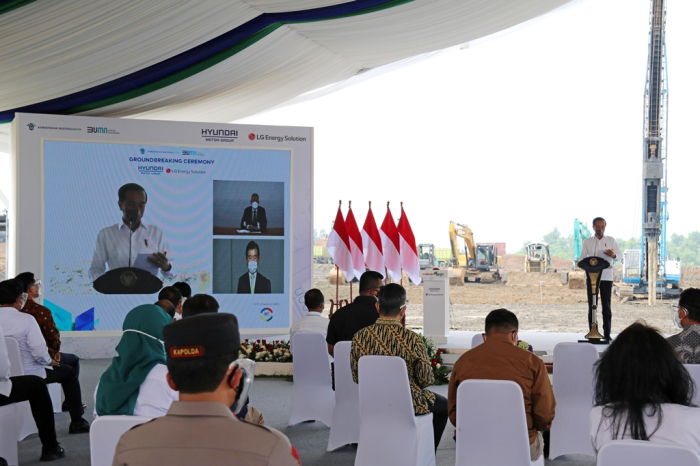
Indonesian President Joko Widodo and other government officials attended the groundbreaking ceremony in 2021, while Chung and LG Energy executives joined the event online from Korea due to the COVID-19 pandemic.
The factory will produce NCMA (nickel, cobalt, manganese and aluminum) lithium-ion battery cells, which are chemically more stable and richer in energy density compared to NCM battery cells.
With the battery plant, Hyundai officials said it will become the first automaker in Indonesia to establish a local EV supply chain from battery cells to finished vehicles, leading IndonesiaŌĆÖs electrification transition.
Indonesia has ample mineral resources such as nickel and cobalt ŌĆō key raw materials for EV battery production. It is the worldŌĆÖs top nickel producer with the largest reserves.
During his visit to the factory, he and other Hyundai executives thoroughly inspected the facilities and discussed HyundaiŌĆÖs strategy to enhance its presence in the fast-growing EV market in the region, company officials said.
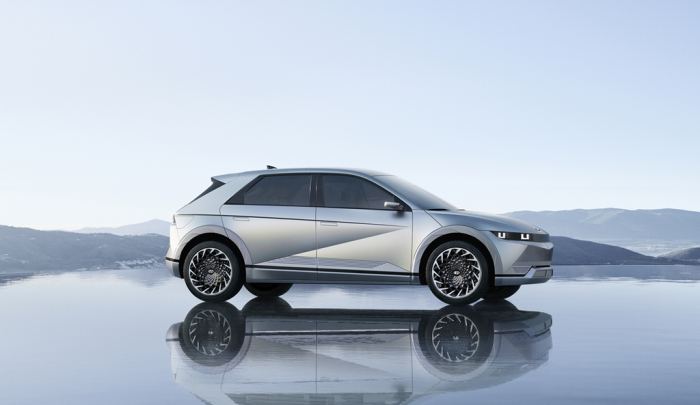
LOCAL MANUFATURING OF IONIQ 5
In Indonesia, Hyundai is currently producing its flagship EV model, the IONIQ 5 crossover, at its plant in the Deltamas Industrial complex in Bekasi Regency, about 40 km east of Jakarta.
The IONIQ 5 is the first foreign model locally produced in the country.
Hyundai has been ramping up its Indonesian business to crack the Indonesian market dominated by Japanese carmakers such as Toyota and Honda, which have long reigned as undisputed champions with their names on more than eight out of every 10 passenger cars sold in the country.
Earlier this week, Hyundai said it has become IndonesiaŌĆÖs top EV seller, driven by the locally produced IONIQ 5, overtaking JapanŌĆÖs Toyota.
Hyundai also plans to launch its first electric sedan, the IONIQ 6, in the Indonesian market in the near future.
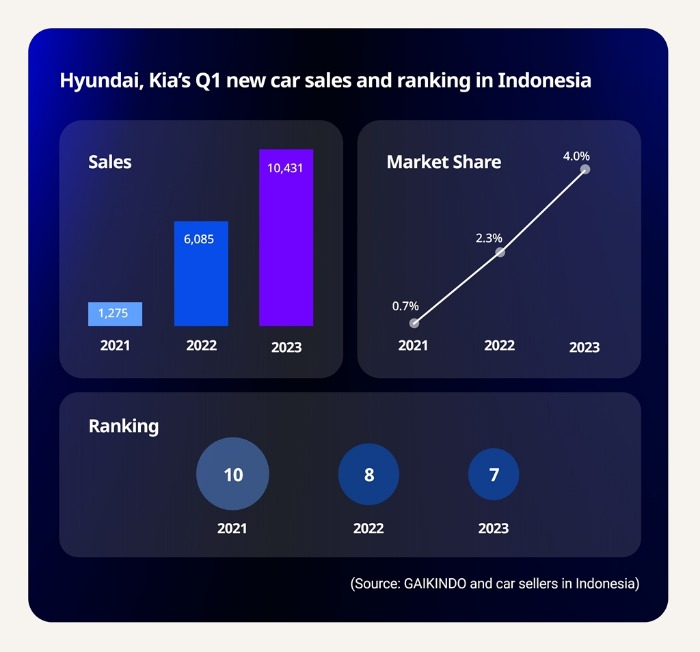
LEVERAGING INDONESIA FOR ASEAN MARKET
The Indonesian government has been offering generous tax incentives for global automakers to expand the countryŌĆÖs EV penetration rates, with at least one in five vehicles running on its roads to be electric by 2025.
Hyundai has been trying to turn Indonesia into its manufacturing hub in the region for its advance into the ASEAN market.
The Korean company is also actively building an EV charging infrastructure across Indonesia.
On Tuesday, its Indian unit signed an initial agreement with Lippo Malls Indonesia, the distribution unit of property conglomerate Lippo Group, to jointly install 52 charging stations at Lippo Malls.
The worldŌĆÖs fourth most populous country with 270 million people, Indonesia accounts for more than a third of car sales in the ASEAN market.
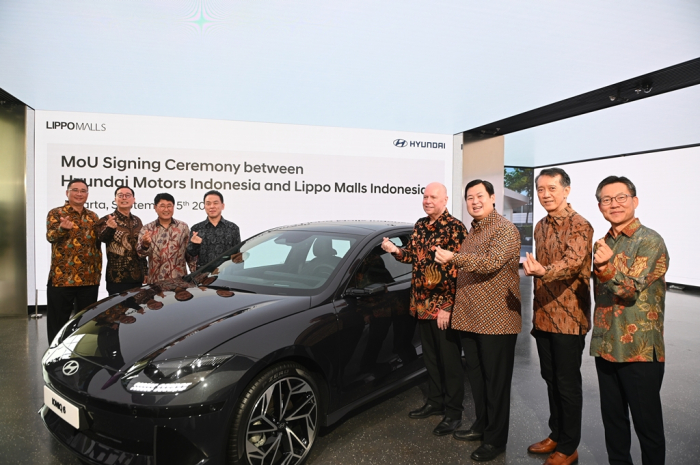
Under the ASEAN Free Trade Agreement (AFTA), if more than 40% of EV components are locally procured, such vehicles made in Indonesia can be exported to other ASEAN countries duty free.
With the Comprehensive Economic Partnership Agreement (CEPA) between Korea and Indonesia coming into effect early this year, bilateral business projects, including in the auto industry, will become more active, company officials said.
The size of the ASEAN auto market stood at 1.63 million units in the first half, up 1.2% from a year earlier, data from the ASEAN Automotive Federation showed. The market is forecast to grow to 3.42 million by year-end.
Write to Sungsu Bae at baebae@hankyung.com
In-Soo Nam edited this article.
More to Read
-
 AutomobilesHyundai leads IndonesiaŌĆÖs EV push with locally produced IONIQ 5
AutomobilesHyundai leads IndonesiaŌĆÖs EV push with locally produced IONIQ 5Sep 05, 2023 (Gmt+09:00)
4 Min read -
 AutomobilesHyundai, Kia to showcase new cars at IndonesiaŌĆÖs GIIAS auto show
AutomobilesHyundai, Kia to showcase new cars at IndonesiaŌĆÖs GIIAS auto showAug 04, 2023 (Gmt+09:00)
3 Min read -
 Debt financingHyundai-LGŌĆÖs Indonesia battery financing chosen as Asia deal of 2022
Debt financingHyundai-LGŌĆÖs Indonesia battery financing chosen as Asia deal of 2022Jul 06, 2023 (Gmt+09:00)
3 Min read -
 Electric vehiclesHyundaiŌĆÖs IONIQ 6 travels faster, farther than Tesla Model Y, Mercedes EQS
Electric vehiclesHyundaiŌĆÖs IONIQ 6 travels faster, farther than Tesla Model Y, Mercedes EQSJul 14, 2022 (Gmt+09:00)
3 Min read -
 AutomobilesHyundai to make IONIQ 5 in Indonesia, EV hub for ASEAN market
AutomobilesHyundai to make IONIQ 5 in Indonesia, EV hub for ASEAN marketMar 16, 2022 (Gmt+09:00)
3 Min read -
 BatteriesHyundai, LG Energy break ground on $1.1 bn Indonesia battery plant
BatteriesHyundai, LG Energy break ground on $1.1 bn Indonesia battery plantSep 15, 2021 (Gmt+09:00)
2 Min read
Comment 0
LOG IN


